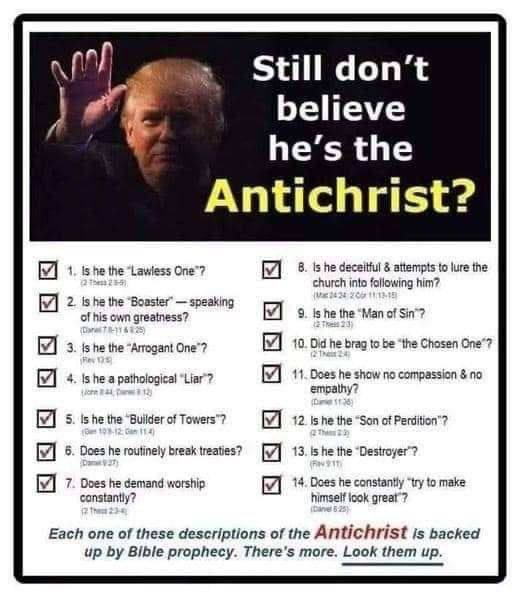A Controversial Figure Or The Antichrist? Exploring The Debate

The term "Antichrist" has been a topic of intrigue and speculation for centuries, often associated with figures who embody evil or challenge traditional beliefs. In modern times, some individuals have controversially connected this concept to Donald Trump, the 45th President of the United States. This association has sparked numerous debates, with opinions varying widely among political analysts, religious leaders, and the general public. As we dive into this topic, we will explore the origins of the Antichrist concept, Trump’s public persona, and the implications of labeling him as such.
The notion of Trump as the Antichrist is not merely a political statement; it transcends into the realms of theology and cultural commentary. Many proponents of this theory cite his divisive rhetoric, controversial policies, and the fervor of his supporters as indicators of an Antichrist-like figure. However, this raises essential questions: What qualifies someone to be labeled as the Antichrist? Are such claims grounded in political ideology or a deeper spiritual interpretation?
As we navigate through this contentious narrative, we invite readers to consider various perspectives on the matter. Is labeling Trump as the Antichrist a reflection of genuine concern for societal values, or is it an exaggerated critique of his political style? Throughout this article, we will analyze these questions, providing a comprehensive view of the "Trump Antichrist" debate.
What is the Biography of Donald Trump?
Donald John Trump was born on June 14, 1946, in Queens, New York City. He is the fourth of five children of Frederick C. and Mary MacLeod Trump. His father was a successful real estate developer, and Donald followed in his footsteps, taking the reins of the family business. Over the years, he expanded his ventures into various domains, including entertainment and politics.
| Personal Details | Bio Data |
|---|---|
| Full Name | Donald John Trump |
| Date of Birth | June 14, 1946 |
| Place of Birth | Queens, New York City, USA |
| Occupation | Businessman, Television Personality, Politician |
| Political Party | Republican |
| Spouse | Melania Trump (m. 2005) |
Why Do Some People Call Trump the Antichrist?
The label "Antichrist" is often attributed to figures who are seen as embodiments of evil or opposition to Christ. For many who associate Trump with this term, it stems from several key factors:
- Rhetoric and Behavior: Critics argue that Trump's inflammatory language and polarizing behavior reflect traits associated with malevolent figures.
- Political Actions: Policies that target minority groups or undermine democratic institutions raise alarms for some observers.
- Support from Extremist Groups: The backing of white supremacist and extremist factions has fueled claims of Trump being an Antichrist figure.
- Religious Interpretations: Some religious groups view Trump’s actions as fulfilling biblical prophecies regarding the Antichrist.
What Are the Theological Implications of Labeling Trump as the Antichrist?
The theological implications of labeling a political figure as the Antichrist are profound. It raises questions about the intersection of faith and politics, as well as the responsibilities of believers in the face of potential evil. Here are some points to consider:
How Does This Affect the Faithful?
For many Christians, calling Trump the Antichrist could lead to a crisis of faith or a reevaluation of their political beliefs. It challenges them to consider:
- Can a believer support a leader perceived as evil?
- What does this mean for the church's role in politics?
- How should Christians respond to societal issues that align with these interpretations?
Is This Labeling a Form of Political Manipulation?
Many opponents of the Antichrist label argue that it is a tool for political manipulation. They suggest that:
- Using such extreme labels distracts from legitimate political discourse.
- It may alienate potential supporters and deepen societal divisions.
- It risks trivializing biblical teachings and prophecies.
What Are the Historical Contexts of Antichrist Claims?
The term “Antichrist” has a rich historical context, appearing in various religious texts and interpretations. Understanding its evolution can shed light on why some connect it to contemporary figures like Trump:
Where Did the Concept of the Antichrist Originate?
The concept originates from early Christian texts, notably the New Testament. It refers to an individual or force opposing Christ, often associated with deception and evil. Over time, it has been applied to various historical and political figures, including:
- Roman emperors who persecuted Christians.
- Dictators like Adolf Hitler.
- Modern political leaders viewed as threats to democracy.
How Have Different Groups Interpreted the Antichrist Throughout History?
Interpretations of the Antichrist have varied widely over centuries, influenced by cultural, social, and political contexts. Some of these interpretations include:
- Literal interpretations: Viewing the Antichrist as a specific individual.
- Symbolic interpretations: Considering the Antichrist as a representation of systemic evil.
- Modern interpretations: Connecting the Antichrist to contemporary political figures.
What Can We Learn From the Trump Antichrist Debate?
The debate surrounding Trump and the Antichrist concept highlights significant societal and cultural issues. It encourages us to reflect on:
- The power of language in shaping public perception.
- The responsibility of leaders in fostering unity or division.
- The role of faith in navigating political landscapes.
Is the Antichrist Label a Reflection of Our Times?
Ultimately, the application of the Antichrist label to Trump invites us to examine the state of our society. It reflects deep-seated fears and anxieties about leadership, morality, and the future. As we continue to grapple with these issues, it is essential to approach the discussion with care, recognizing the complexities involved.
In conclusion, the "Trump Antichrist" debate serves as a lens through which we can explore broader themes of good versus evil, leadership ethics, and the intersection of faith and politics. Whether one agrees with the label or not, it is undeniable that the conversation around it is crucial in today's polarized world.
ncG1vNJzZmivp6x7o77EnKKepJxjwqx7yaiqrKaVrMB2e9OrrKaoXZa7tbXCoamiq6RjtbW5yw%3D%3D